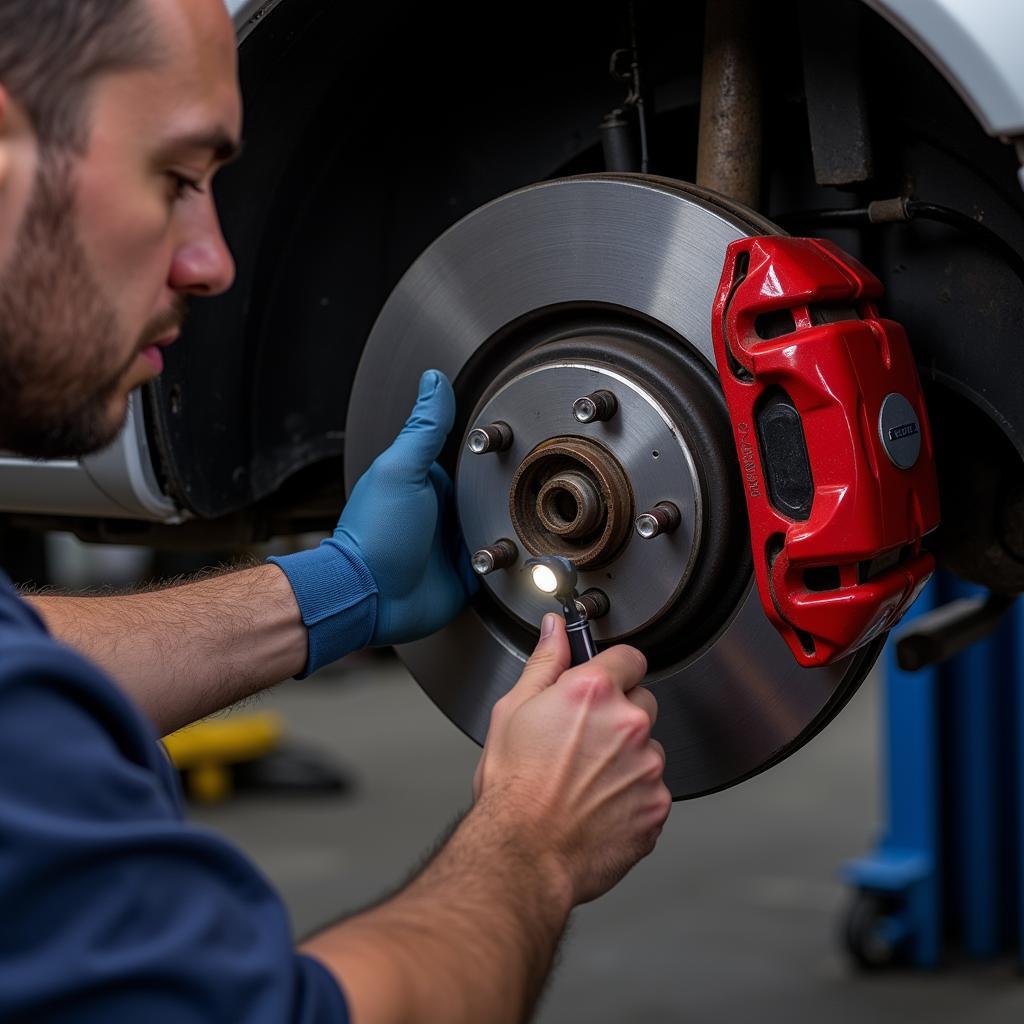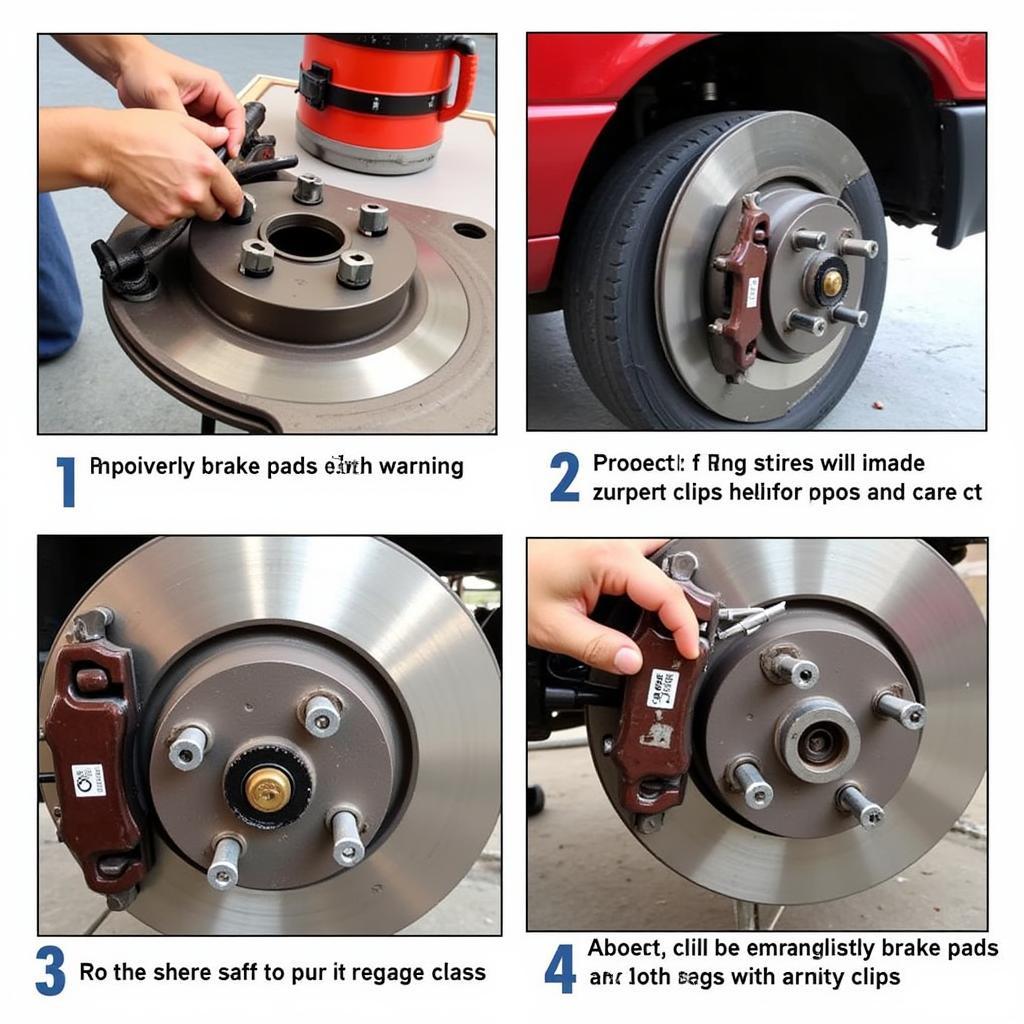That annoying squeal coming from your 1999 Ford Ranger’s brakes? It’s likely related to the brake warning clips. This guide dives deep into the world of 99 Ford Ranger brake squeal warning clips, offering solutions for diagnosing, fixing, and preventing this common issue. We’ll cover everything from the basics of how these clips work to more advanced troubleshooting techniques.
Understanding Your 99 Ford Ranger Brake System and Squeal
The brake system in your 1999 Ford Ranger is a crucial safety component. Understanding its parts, including the brake warning clips, is key to maintaining optimal performance. These small metal clips play a vital role in alerting you to worn brake pads. When the pads wear down to a certain point, the clips come into contact with the rotor, creating a high-pitched squeal. This audible warning is designed to prompt you to replace your brake pads before they wear down completely, preventing damage to the rotors and ensuring safe braking.
Why are my 99 Ford Ranger brakes squealing?
Brake squealing can be caused by various factors, not just worn pads. Sometimes, rust, debris, or even moisture can cause a similar noise. However, if the squealing is consistent and gets louder when you apply the brakes, it’s highly likely that your brake pads are worn and the warning clips are doing their job.
How do brake warning clips work?
Brake warning clips are small, thin pieces of metal attached to the brake pad backing plate. They are designed to make contact with the rotor when the brake pad material wears down to a critical level. This contact creates friction, resulting in the characteristic squealing sound. It’s a simple yet effective mechanism for alerting drivers to the need for brake maintenance.
Diagnosing the Squeal: Is it the Warning Clips?
Before jumping to conclusions, it’s important to diagnose the squeal properly. Here’s a step-by-step guide to help you determine if the brake warning clips are the culprits:
- Listen carefully: Does the squealing occur only when you apply the brakes? Does it get louder or change pitch as you brake harder?
- Inspect your brakes: If possible, visually inspect your brake pads. Look for signs of wear, such as thin pad material or exposed metal.
- Test drive: Pay close attention to the squealing sound during a test drive. Does it change with speed or only happen when braking?
What if it’s not the warning clips?
If your inspection reveals that the brake pads are still thick and the warning clips aren’t contacting the rotor, the squeal might be caused by something else. This could include glazed brake pads, rust on the rotors, or even a faulty caliper.
 Diagnosing 1999 Ford Ranger Brake Squeal
Diagnosing 1999 Ford Ranger Brake Squeal
Fixing the Squeal: Replacing Brake Pads and Clips
If you’ve determined that the brake warning clips are the cause of the squeal, it’s time to replace your brake pads. It’s generally recommended to replace the warning clips along with the pads. This ensures accurate wear indication and prevents future squealing.
- Gather your tools and materials: You’ll need new brake pads, brake warning clips, a jack, jack stands, lug wrench, and basic hand tools.
- Lift and secure your vehicle: Safely lift your 1999 Ford Ranger using a jack and secure it with jack stands.
- Remove the wheel: Remove the wheel to access the brake caliper and pads.
- Replace the brake pads and clips: Follow the proper procedure for your specific vehicle model. This usually involves compressing the caliper piston, removing the old pads and clips, and installing the new ones.
- Reassemble and test: Reinstall the wheel, lower the vehicle, and test the brakes. The squealing should be gone.
“Replacing brake pads and clips is a relatively straightforward job, even for DIYers,” says John Miller, ASE Certified Master Technician. “However, if you’re not comfortable working on your brakes, it’s always best to consult a qualified mechanic.”
 Replacing 1999 Ford Ranger Brake Pads and Clips
Replacing 1999 Ford Ranger Brake Pads and Clips
Preventing Future Brake Squeal
Regular brake inspections are crucial for preventing future squealing and ensuring optimal braking performance. “A little preventative maintenance can go a long way in avoiding costly repairs down the road,” adds Miller. Here are some tips:
- Check your brake pads regularly: Visually inspect your brake pads every few months or every time you rotate your tires.
- Listen for unusual noises: Pay attention to any squealing, grinding, or scraping sounds coming from your brakes.
- Follow a regular maintenance schedule: Consult your owner’s manual for recommended brake service intervals.
Conclusion
Addressing the brake squeal on your 99 Ford Ranger by inspecting and replacing worn brake pads and warning clips is essential for maintaining safety and preventing further damage. By following the steps outlined in this guide, you can effectively diagnose and fix the issue, ensuring your 1999 Ford Ranger’s brakes are in top condition. Don’t ignore that squeal – it’s your vehicle telling you something important!
